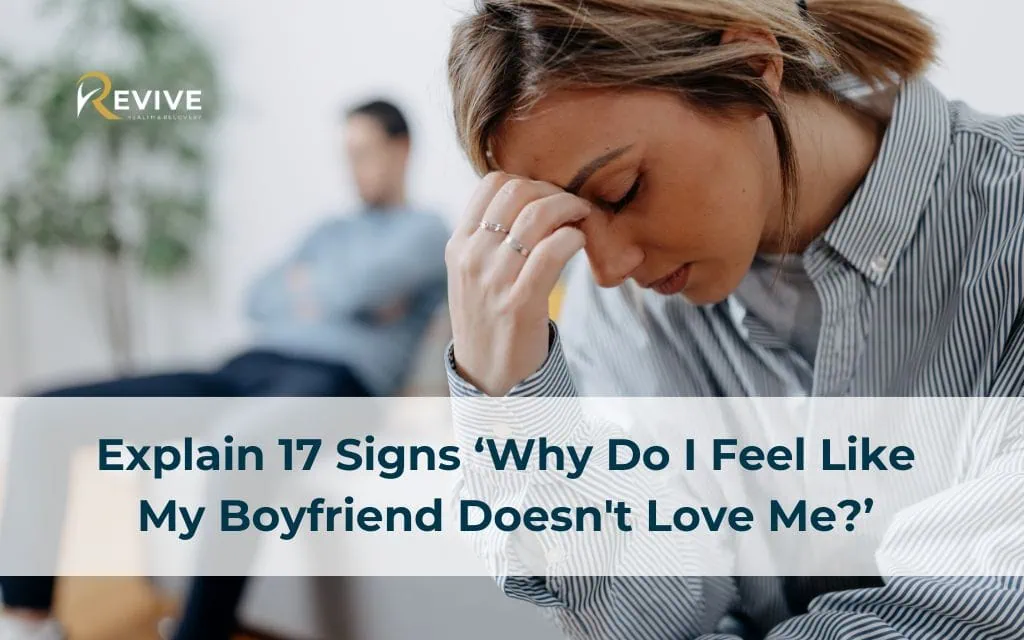Feeling disconnected from your partner can be overwhelming, leaving you questioning your relationship. When you constantly ask, “why do I feel like my boyfriend doesn’t love me?”, it often reflects deeper emotional struggles. This uncertainty may arise from communication issues, psychological patterns, or shifts in the relationship that require attention.
Emotional uplift strategies can help you process these feelings, rebuild self-confidence, and gain clarity. At Revive Health Recovery in Denver, we support individuals and couples in navigating these complex emotions to strengthen connections and restore emotional well-being. If you’re unsure about the foundation of your relationship, you deserve to find the answers and support you need to move forward with confidence.
The Psychology of Feeling Unloved in Relationships
Understanding why do I feel like my boyfriend doesn’t love me requires examining the psychological patterns behind romantic disconnection. These feelings develop through intricate processes involving attachment patterns, neurochemical changes, and emotional security needs. The question “why do I feel like my boyfriend doesn’t love me” often reflects deeper psychological dynamics rather than actual relationship problems.
Understanding Attachment Styles and Their Impact
Attachment theory, developed by John Bowlby, explains how early childhood relationships shape your adult romantic patterns. Research shows only 50-60% of adults maintain secure attachment styles, directly affecting relationship stability and emotional regulation.
Anxious attachment creates heightened sensitivity to partner behaviors. You might interpret normal stress responses as rejection signals. When you ask yourself “why do I feel like my boyfriend doesn’t love me,” anxious attachment often amplifies minor relationship changes into major concerns.
Avoidant attachment leads to emotional withdrawal when intimacy feels overwhelming. Disorganized attachment combines both patterns, creating confusing relationship dynamics that make partners question their connection.
Your attachment style influences how you perceive love expressions. Secure individuals trust their partner’s affection even during difficult periods. Insecure attachment styles require more frequent reassurance and struggle with relationship uncertainty.
Neurochemical Changes in Long-Term Relationships
Brain chemistry shifts significantly as relationships progress through different stages. The initial attraction phase floods your system with dopamine, creating intense excitement and focus on your partner. This neurochemical rush naturally decreases over time, which many people misinterpret as falling out of love.
Long-term bonding relies on oxytocin and vasopressin rather than dopamine. These hormones create deeper emotional connections but produce subtler feelings than early romance. Partners who understand this transition adapt their expectations and find new ways to maintain intimacy.
Stress hormones like cortisol interfere with bonding chemicals. Chronic relationship stress, work pressure, or health challenges can suppress oxytocin production, creating emotional distance even when love remains strong.

The Role of Emotional Security in Partnership Satisfaction
Emotional security forms the foundation of healthy relationships. When you feel safe expressing vulnerability, sharing concerns, and trusting your partner’s commitment, love flourishes naturally. Insecurity erodes this foundation, creating defensive patterns that damage intimacy.
Dr. John Gottman’s research identifies “bidding for connection” as crucial for relationship success. Partners make small attempts for attention, affection, or support throughout each day. Successful couples respond positively 86% of the time, while struggling couples respond only 33% of the time.
Emotional security develops through consistent positive responses to these connection bids. When your boyfriend regularly ignores or dismisses your attempts for closeness, you naturally begin questioning his love and commitment.
17 Clear Signs He May Be Falling Out of Love
Recognizing genuine relationship warning signs helps address the question “why do I feel like my boyfriend doesn’t love me” with objective evidence rather than emotional assumptions. These indicators reflect consistent behavioral patterns rather than isolated incidents during stressful periods. Understanding why did you feel like your boyfriend doesn’t love you becomes clearer when you examine specific behavioral changes.
Communication and Emotional Withdrawal Patterns
1. Conversations become superficial or entirely avoided – When deep discussions about feelings, future plans, or relationship concerns are consistently deflected, minimized, or avoided entirely, your relationship loses its emotional intimacy foundation.
2. Nonverbal communication changes dramatically – Reduced eye contact, minimal physical touch during conversations, and distracted body language indicate emotional withdrawal. These subtle shifts often precede more obvious relationship changes.
3. Digital communication patterns shift – Partners who stop sharing daily experiences, sending affectionate messages, or responding promptly to important texts may be creating emotional distance.
4. Responses to serious relationship discussions become defensive – Partners who remain emotionally invested engage with difficult topics even when uncomfortable, while withdrawn partners consistently deflect or shut down conversations.
Physical Intimacy and Affection Changes
5. Casual physical affection decreases significantly – Spontaneous hugs, hand-holding, and cuddling create emotional bonds that strengthen relationships. When these behaviors decrease dramatically, it often reflects reduced emotional connection.
6. Sexual intimacy avoidance becomes consistent – While temporary decreases due to stress, health issues, or medication are normal, complete avoidance of physical intimacy combined with other withdrawal signs suggests deeper problems.
7. Physical contact becomes mechanical or perfunctory – Perfunctory kisses, distracted embraces, and mechanical physical contact lack the emotional warmth that characterizes loving relationships.
8. Sleep patterns create physical distance – Partners who consistently choose separate sleeping arrangements, avoid bedtime conversations, or maintain rigid physical boundaries may be creating emotional distance.

Future Planning and Commitment Indicators
9. Future event discussions receive vague or evasive responses – Enthusiastic engagement suggests continued commitment, while vague responses or topic changes may indicate uncertainty about your relationship’s future.
10. Financial planning conversations are avoided – Partners planning long-term futures typically discuss shared expenses, savings goals, and major purchases together. Reluctance to engage suggests emotional withdrawal.
11. Holiday and vacation planning excludes you – Partners who consistently avoid including you in future plans or make individual arrangements without consultation may be emotionally disengaging.
12. Family introductions and social events are avoided – Committed partners typically include their significant other in social activities and introduce them to important people in their lives.
Social and Lifestyle Priority Shifts
13. Individual activities consistently take priority over shared experiences – Notice whether your boyfriend regularly chooses solo activities over couple time, especially when these patterns represent recent changes.
14. Work-life balance shifts dramatically toward work – While career demands fluctuate naturally, partners who consistently prioritize work over relationship time may be using professional obligations to create emotional distance.
15. New hobbies or interests completely exclude you – Activities that require significant time investment but entirely exclude you, especially when combined with other withdrawal signs, may indicate reduced relationship investment.
16. Friend circles become separate and exclusive – Partners who stop including you in friend gatherings or develop entirely separate social circles may be creating emotional distance.
17. Important life decisions are made independently – When significant choices about career moves, living situations, or major purchases are made without your input or consideration, it suggests reduced partnership investment.
When It’s Your Insecurity vs. Real Relationship Problems
The persistent question “why do I feel like my boyfriend doesn’t love me” sometimes reflects internal anxiety rather than actual relationship issues. Distinguishing between relationship anxiety and genuine partnership problems requires honest self-reflection and objective evaluation. Both scenarios cause emotional distress, but they require different approaches for resolution.
Identifying Anxious Attachment Triggers
Anxious attachment creates heightened sensitivity to perceived rejection signals. Common triggers include delayed text responses, changes in routine affection, increased work stress, or interactions with other women. These situations activate your attachment system, flooding you with anxiety and insecurity.
Examine your emotional responses to specific situations. Do you consistently interpret neutral behaviors as rejection signs? Are your concerns based on actual behavioral changes or internal anxiety patterns? Tracking these responses helps identify anxiety-driven versus evidence-based concerns.
Consider your relationship history and family background. Individuals with anxious attachment often experienced inconsistent caregiving or romantic betrayals that created hypervigilance around relationship threats.
Professional assessment can help you understand your attachment patterns and develop healthier relationship responses. At Revive Health Recovery, our specialists help individuals recognize anxiety triggers and build emotional regulation skills.
Past Trauma’s Impact on Current Relationship Perception
Previous relationship trauma significantly influences how you interpret current partnership dynamics. Betrayal, abandonment, or emotional abuse create protective mechanisms that sometimes misinterpret present situations through past experiences.
Trauma responses include emotional flashbacks where current situations trigger intense emotions from previous experiences. You might feel overwhelming fear about relationship loss even when your current partner shows consistent love and commitment.
Hypervigilance develops as a protective mechanism but can damage healthy relationships. You might constantly scan for threat signals, interpreting innocent behaviors as warning signs based on past experiences rather than current reality.
Healing trauma requires professional support to process past experiences and develop present-focused relationship skills. Our trauma-informed approach at Revive Health Recovery helps individuals separate past hurts from current relationship dynamics.
Distinguishing Between Temporary Stress and Permanent Changes
Life stress affects relationship dynamics temporarily without indicating fundamental partnership problems. Work pressure, family illness, financial concerns, or major life transitions naturally impact emotional availability and affection expression.
Temporary stress typically maintains underlying respect, commitment, and willingness to address problems together. Partners experiencing external stressors usually acknowledge their reduced availability and express appreciation for understanding and support.
Permanent changes involve consistent patterns over 2-3 months without external stressor explanations. These changes often include fundamental shifts in values, goals, or emotional investment that persist regardless of circumstances.
Professional evaluation helps distinguish between temporary relationship challenges and deeper compatibility issues. Our relationship specialists at Revive Health Recovery provide objective assessment and guidance for couples navigating difficult periods.

The Three Distancing Behaviors: Psychological Research Insights
When exploring why do I feel like my boyfriend doesn’t love me, psychological research identifies three primary patterns people use to create emotional distance in relationships. Understanding these behaviors helps you recognize whether your partner is actively disengaging or responding to other stressors. These patterns often explain why do I feel like my boyfriend doesn’t love me even when the relationship isn’t actually ending.
Detachment: When Partners Create Emotional Walls
Emotional detachment involves psychological withdrawal while maintaining physical presence in the relationship. Partners become emotionally unavailable, sharing less personal information and responding with minimal emotional investment.
Detached partners often describe feeling “numb” or “disconnected” rather than angry or resentful. They may continue relationship routines while lacking emotional engagement that previously characterized your connection.
This pattern sometimes develops as a protective mechanism when partners feel overwhelmed by relationship intensity or external stressors. However, prolonged detachment damages intimacy and requires professional intervention to restore emotional connection.
Communication with detached partners feels hollow and superficial. They respond to questions without volunteering personal thoughts or feelings, creating one-sided conversations that leave you feeling lonely despite their presence.
Non-Involvement: Avoiding Future Commitments and Plans
Non-involvement manifests through reluctance to engage in future planning or shared decision-making. Partners avoid discussions about relationship milestones, shared goals, or long-term commitments.
This behavior pattern includes declining to make plans beyond immediate timeframes, expressing uncertainty about relationship direction, and avoiding situations that require commitment declarations.
Non-involved partners often claim they need “space” or “time to think” without providing specific timelines or clear explanations about their concerns. This ambiguity creates anxiety and uncertainty for their partners.
Professional intervention can help address underlying fears or conflicts that drive non-involvement patterns. Our relationship counseling services in Denver help couples communicate about commitment concerns and work toward shared future visions.
Antagonism: Using Conflict to Create Distance
Antagonistic behavior involves creating conflict to justify emotional distance. Partners pick fights over minor issues, criticize frequently, or respond defensively to reasonable requests for connection.
This pattern allows individuals to blame relationship problems on their partner’s reactions rather than acknowledging their own emotional withdrawal. They create negative interactions that make closeness feel impossible or undesirable.
Gottman’s research identifies criticism, contempt, defensiveness, and stonewalling as the “Four Horsemen” that predict relationship failure. Antagonistic partners often display multiple horsemen behaviors consistently.
Addressing antagonistic patterns requires professional intervention to identify underlying emotions and develop healthier conflict resolution skills. Our therapy approach helps couples break destructive communication cycles.
Understanding Love Languages and Mismatched Communication
The question “why do I feel like my boyfriend doesn’t love me” often stems from mismatched love languages rather than actual lack of affection. Gary Chapman’s love languages framework identifies five primary ways people express and receive love: words of affirmation, acts of service, receiving gifts, quality time, and physical touch. Mismatched love languages create disconnection even when both partners remain committed.
How Different Love Languages Create Disconnection
When partners express love differently than their significant other receives it, both individuals can feel unloved despite genuine affection. Your boyfriend might show love through acts of service while you need words of affirmation, creating mutual frustration and misunderstanding.
This mismatch becomes particularly problematic during stressful periods when partners naturally default to their primary love language for self-soothing. If your languages differ significantly, stress can increase feelings of disconnection rather than bringing you closer together.
Cultural and family backgrounds influence love language development. Understanding these influences helps couples appreciate different affection expressions without interpreting them as reduced love or commitment.
Professional guidance helps couples identify their love languages and develop strategies for meeting each other’s emotional needs effectively. Our counselors at Revive Health Recovery specialize in helping Denver couples improve their emotional connection.
The Impact of Unmet Emotional Needs
Unmet emotional needs create resentment and disconnection over time. When you consistently give and receive love in ways that don’t resonate with your partner, both individuals feel unappreciated despite their efforts.
This dynamic often creates pursue-withdraw patterns where one partner seeks more connection while the other feels overwhelmed and retreats further. These cycles damage relationship satisfaction and create ongoing emotional distress.
Emotional needs extend beyond love languages to include validation, security, autonomy, and personal growth support. Healthy relationships address all these areas through open communication and mutual effort.
Addressing unmet needs requires honest communication about your emotional requirements and willingness to learn new ways of expressing affection. Professional support facilitates these difficult conversations and helps couples develop sustainable connection strategies.
Recognizing Your Partner’s Primary Love Language
Observing how your boyfriend naturally expresses affection reveals his primary love language. Does he offer help with tasks, plan special experiences, give thoughtful compliments, or prioritize physical closeness? These behaviors indicate how he most naturally shows love.
Notice what he requests or complains about most frequently. If he mentions feeling unappreciated despite helping with household tasks, acts of service likely represent his primary love language.
Pay attention to how he responds to different affection expressions. His enthusiasm for specific gestures indicates which ones resonate most deeply with his emotional needs.
Creating a love language action plan helps both partners meet each other’s needs consistently. This practical approach improves relationship satisfaction and reduces feelings of disconnection.
Denver’s Unique Relationship Challenges
When Denver residents ask “why do I feel like my boyfriend doesn’t love me,” local factors often contribute to relationship stress. Living in Denver creates specific stressors that impact relationship dynamics. Understanding these local factors helps couples address location-specific challenges while building stronger partnerships.
Mile-High City Lifestyle Stress on Relationships
Denver’s high altitude affects serotonin levels, potentially impacting mood and relationship satisfaction. Lower oxygen levels can increase fatigue and reduce emotional resilience, making relationship conflicts feel more intense than they actually are.
The city’s rapid growth creates housing stress, longer commutes, and increased cost of living that pressure relationships. Financial strain and lifestyle changes require couples to adapt their expectations and support systems.
Denver’s seasonal weather patterns, including intense sun exposure and dramatic temperature changes, affect mental health and relationship dynamics. Seasonal affective patterns can temporarily impact emotional availability and intimacy.
Professional support helps couples understand how environmental factors influence their relationship and develop strategies for managing location-specific stressors effectively.
Colorado’s Outdoor Culture and Partnership Dynamics
Colorado’s outdoor recreation culture creates unique relationship opportunities and challenges. Partners with different activity preferences or fitness levels might struggle to find shared interests and quality time activities.
The state’s emphasis on health and wellness can create pressure for couples to maintain specific lifestyle standards. These expectations sometimes conflict with natural relationship comfort and acceptance.
Social circles often center around outdoor activities, potentially excluding partners who don’t participate in skiing, hiking, or other adventure sports. This dynamic can create feelings of isolation or relationship inadequacy.
Successful Colorado couples learn to balance outdoor activities with intimate indoor time and respect different interest levels without judgment or pressure.
Work-Life Balance in Denver’s Growing Economy
Denver’s booming economy creates career opportunities but also demands that can strain relationships. Tech industry growth brings high-stress jobs with long hours and frequent travel requirements.
The city’s entrepreneurial culture encourages professional ambition that sometimes conflicts with relationship priorities. Partners may struggle to balance career advancement with emotional intimacy and shared time.
Networking and professional social events can create additional relationship stress if partners have different comfort levels with these activities or feel excluded from professional circles.
Establishing clear work-life boundaries and regular relationship check-ins helps couples navigate Denver’s demanding professional environment while maintaining emotional connection.
Practical Steps for Relationship Assessment and Healing
Taking action to address the question “why do I feel like my boyfriend doesn’t love me” requires courage and commitment from both partners. These practical strategies help you evaluate your situation objectively and take steps toward healing or resolution. Understanding why do I feel like my boyfriend doesn’t love me becomes actionable through specific assessment and communication techniques.
Self-Reflection Questions for Clarity
Before addressing relationship concerns with your boyfriend, examine your own emotional patterns and expectations. Ask yourself: “Are my concerns based on consistent behavioral changes or internal anxiety patterns?” This honest assessment helps you approach conversations from a grounded perspective.
Consider your relationship satisfaction over the past six months rather than focusing on recent interactions. Temporary stress can temporarily impact relationship dynamics without indicating fundamental problems.
Evaluate whether your expectations align with realistic relationship development. Early romance intensity naturally decreases over time, but this doesn’t indicate reduced love or commitment.
Professional guidance helps you process these self-reflection insights and develop clear communication strategies. Our individual counseling services support personal growth alongside relationship healing.
Healthy Communication Strategies to Try
Initiating honest conversations about relationship concerns requires careful timing and approach. Choose moments when both partners feel calm and have adequate time for meaningful discussion without distractions.
Use “I” statements to express your feelings without creating defensiveness. Instead of saying “you don’t show affection anymore,” try “I’ve been feeling disconnected and would appreciate more physical affection.”
Focus on specific behaviors rather than character judgments. Describe observable actions and their impact on your feelings rather than making assumptions about his intentions or motivations.
Create space for your partner to share his perspective without immediate responses or solutions. Sometimes relationship concerns stem from stressors or challenges he hasn’t communicated effectively.
When to Seek Professional Relationship Support
Professional help becomes essential when communication attempts consistently result in conflict, avoidance, or increased emotional distance. These patterns indicate deeper issues that require specialized intervention.
Consider counseling if you’ve noticed multiple warning signs over several months without improvement despite your efforts to address concerns directly with your partner.
Mental health support helps when relationship anxiety significantly impacts your daily functioning, sleep patterns, or other life areas. Individual therapy can address anxiety while couples work improves relationship dynamics.
Crisis situations, including thoughts of self-harm, substance use, or abusive behaviors, require immediate professional intervention. Don’t hesitate to seek emergency support when safety concerns arise.
At Revive Health Recovery, our team provides comprehensive relationship support through individual therapy, couples counseling, and group programs designed specifically for relationship healing.
FAQs About Question “Why Do I Feel Like My Boyfriend Doesn’t Love Me”
How do I know if my feelings of being unloved are justified or just insecurity?
Look for consistent patterns over 2-3 months rather than isolated incidents. Real relationship issues typically involve multiple signs like reduced communication, avoided future planning, and emotional withdrawal. Insecurity often stems from past experiences or anxiety disorders. Revive Health Recovery specializes in helping Denver residents distinguish between anxiety and genuine relationship concerns through professional assessment.
Can a relationship recover when one partner has fallen out of love?
Yes, with professional help and mutual commitment. Research shows 70% of couples in Emotionally Focused Therapy experience significant improvement. However, both partners must be willing to participate in the healing process. Our couples therapy programs in Denver provide evidence-based approaches for relationship restoration.
What’s the difference between normal relationship stress and serious problems?
Normal stress involves temporary challenges due to external factors (work, family, finances) but maintains underlying affection and respect. Serious problems include consistent contempt, emotional withdrawal, and unwillingness to address issues together. Revive Health Recovery helps Colorado couples identify and address both temporary stressors and deeper relationship issues.
How does living in Denver specifically affect relationships?
Denver’s altitude can affect serotonin levels impacting mood, while the city’s outdoor lifestyle and growing economy create unique stressors. The transient population also makes building long-term relationships more challenging for some couples. Our local expertise helps Denver couples navigate these specific regional challenges.
When should I consider ending the relationship versus seeking help?
Consider professional help first if you still care about each other and are willing to work together. End the relationship if there’s abuse, complete emotional unavailability from your partner, or fundamental incompatibility in life goals after attempting resolution. Revive Health Recovery provides comprehensive assessment services to help you make informed decisions about your relationship future.
Why Choose Revive Health Recovery for Relationship Healing
Revive Health Recovery offers specialized relationship support that addresses both individual and partnership healing needs. Our Denver location at 1427 S Federal Blvd provides convenient access to expert services designed specifically for Colorado residents.
Specialized Relationship Psychology Approach: Our Denver-based team understands the unique psychological factors affecting Colorado relationships, combining evidence-based therapy with personalized healing strategies. We recognize how altitude, lifestyle pressures, and cultural factors impact relationship dynamics in our region.
Holistic Emotional Wellness Focus: Unlike traditional therapy, we address the mind-body connection in relationship healing, incorporating wellness practices that support both individual and partnership growth. Our approach includes trauma-informed care, attachment-focused therapy, and mindfulness techniques.
Flexible, Accessible Support Options: Located conveniently in Denver, we offer various support formats to fit your lifestyle and comfort level with healing. Whether you prefer individual sessions, couples therapy, or group support, we provide options that meet your specific needs.
Expert Understanding of Attachment and Trauma: Our specialists recognize how past experiences shape current relationship patterns, providing targeted support for attachment-related relationship challenges. We help individuals heal trauma responses that interfere with healthy relationship development.
24/7 Availability for Crisis Support: Relationship crises don’t follow business hours. Our team is available around the clock to provide guidance when you need it most. Call us at (303) 268-4655 for immediate support or email contact@revivehealthrecovery.com for more information.
Conclusion
Feeling disconnected from your boyfriend doesn’t mean your relationship is doomed, but it does signal the need for understanding and action. Whether your feelings stem from legitimate relationship changes or personal insecurity, professional support can provide clarity and healing pathways.
At Revive Health Recovery in Denver, we understand the complex psychology behind relationship challenges. Our Denver profesional and compassionate team specializes in helping individuals and couples navigate emotional disconnection, develop healthier communication patterns, and rebuild secure attachments.
Don’t let uncertainty consume your emotional well-being. Take the first step toward clarity and healing by reaching out to our Denver location. Contact us at (303) 268-4655 or email contact@revivehealthrecovery.com to begin your journey toward relationship wellness and emotional security.
Remember: You deserve to feel loved, valued, and emotionally secure in your relationships. Let Revive Health Recovery help you achieve the healthy, connected partnership you desire.



